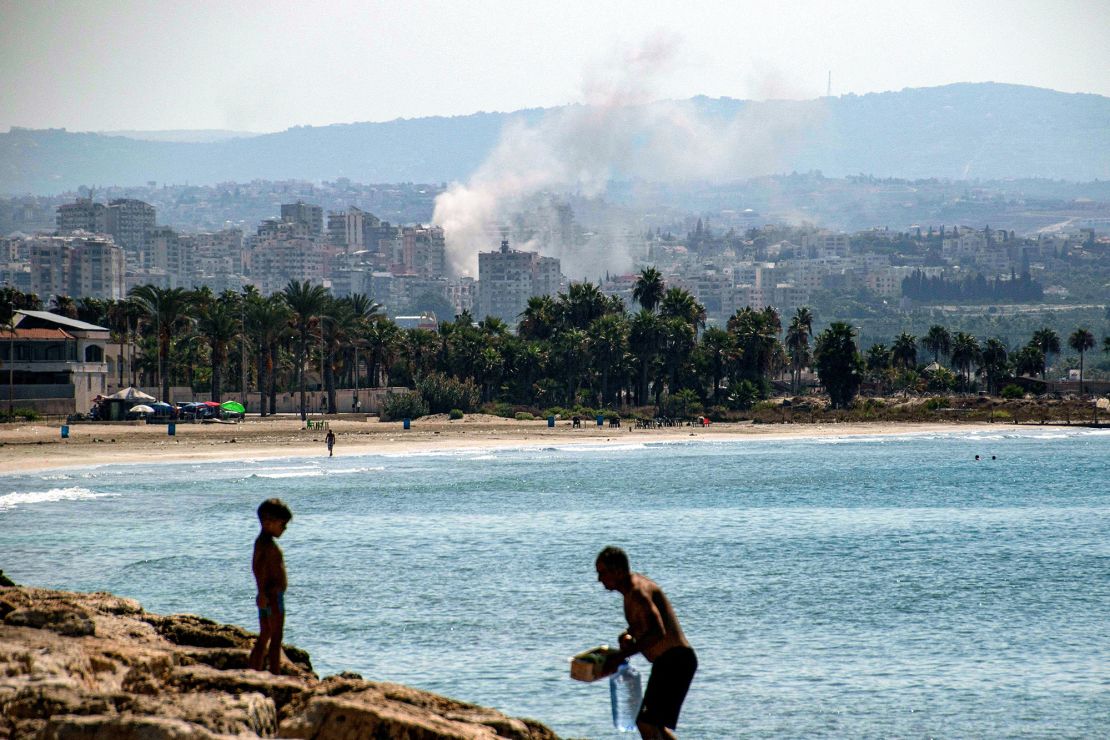CNN
—
Israel intercepted a missile fired by Hezbollah near Tel Aviv on Wednesday, an unprecedented attack by the militant group that reached deep into the country’s commercial heartlands and marked a new escalation in the conflict between the two sides.
People in Tel Aviv and the central city of Netanya raised sirens on Wednesday after Israel’s air defense said it intercepted a surface-to-surface missile — the first time a missile launched by Hezbollah had come close to a city, the Israeli military said. He said.
There were no immediate reports of damage or casualties.
Iran-backed militant group Hezbollah confirmed it fired a Qadr 1 ballistic missile at the headquarters of Israel’s intelligence agency Mossad, which it blames for attacks targeting its members, including the coordinated explosions of thousands of pagers and walkie-talkies last week.
It is believed to be the first ballistic missile fired by Hezbollah at Israel, and Hezbollah said it was launched “in support of our steadfast Palestinian people in Gaza” and “to protect Lebanon and its people.”
The Israeli military said it intercepted the missile near Tel Aviv, a city of more than 4 million people on the Mediterranean coast, and the air force hit its missile in southern Lebanon’s Nafakiye region.
“Following the sounding of sirens in the Tel Aviv and Netanya areas, a surface-to-surface missile from Lebanon was identified and intercepted by an IDF air defense line,” the Israeli military said.
Israeli military spokesman Nadav Shoshani described the missile as “heavy” and “long-range”.
“This is the first time Hezbollah has fired at Tel Aviv,” he said.
Hezbollah leader Hassan Nasrallah has repeatedly said that any Israeli attack on the Lebanese capital would trigger an attack on Israel’s economic center.
Clashes between Israel and Hezbollah continued on Wednesday.

The Israeli military said it struck more than 280 Hezbollah targets in Lebanon on Wednesday.
At least 23 people were killed in Lebanon on Wednesday, the country’s public health ministry said. Most of the deaths were reported in the south of the country, although three people were killed in a mountain village north of Beirut.
Meanwhile, the Israel Defense Forces reported that about 40 missiles entered Israel from Lebanon on Wednesday morning. Several were detained, but one struck an assisted-living facility in northern Israel, causing no injuries.
Since the conflict between Israel and the Palestinian militant group Hamas erupted last October, Hezbollah has launched hundreds of rockets and drones from Lebanon targeting northern Israel.
About 60,000 people have been displaced from the northern part of Israel as a result of the cross-border fighting. Israel has said the fighting will continue until the residents return home safely.
The missile interception comes days after Israeli strikes targeting Hezbollah killed more than 500 people across Lebanon, including dozens of children. Monday was Lebanon’s worst day in nearly two decades.
Flights continued as normal at Tel Aviv’s Ben Gurion Airport on Wednesday, an airport spokesman said.
Sirens were heard in Netanya on Wednesday for the first time since October 7, 2023, according to Israeli officials.
In recent days, Israel and Hezbollah have traded waves of airstrikes and rocket attacks, forcing thousands of people to flee their homes in southern Lebanon.
Israel said it was targeting Hezbollah positions and infrastructure – which it said were embedded in residential areas – with the killing of a senior commander, Ibrahim Kubaisi, on Tuesday. The Israeli military said Kubaisi headed various Hezbollah missile units and was killed along with two other commanders in south Beirut.
Residents who fled their homes in Lebanon reported that neighborhoods had been razed to the ground and entire towns had been evacuated. One man told CNN he saw “relentless bombardment from all directions,” which he described as “blinding bombardment.”

The UN Children’s Agency (UNICEF) warned that many children were “missing under rubble” and trapped on “dangerous roads” after Israeli airstrikes.
At least 558 people, including 50 children and 94 women, were killed in Israeli airstrikes on Monday, Lebanon’s Health Minister Firas Abiad said. More children were killed in a single day on Monday than last year, UNICEF Deputy Representative for Lebanon Ettie Higgins told the UN conference.
Meanwhile, Lebanese hospitals are struggling with an influx of injured people and are having difficulties getting to hospitals for treatment as roads are congested with people trying to flee Israeli strikes. British-Palestinian doctor Ghassan Abu-Sidda said the health system was “very, very fragile” as it could not deal with more than 2,000 injuries in two days.
“Unfortunately, we have children with the same type of injuries that I saw in Gaza,” Abu-Siddah told CNN. “Blast injuries to the face, severed limbs, multiple lacerations, crushing injuries as a result of the houses on top of them collapsing.”
About half a million people have been displaced in Lebanon, the country’s foreign minister said Tuesday, and that number is expected to rise.
Om Hussain’s family was among the thousands who fled the south of the country. They spent 14 hours on the road to Beirut, stranded on congested roads, and said they had no time to collect clothes or medicine. “We didn’t have food or water, but volunteers on motorcycles distributed water to people who were stuck in cars,” he told CNN.
On Wednesday, the Israeli army warned displaced residents of southern Lebanon not to return to their homes.
Israeli troops have conducted exercises simulating a ground war in Lebanon, which the military has not ruled out.
This is a developing story and will be updated.
